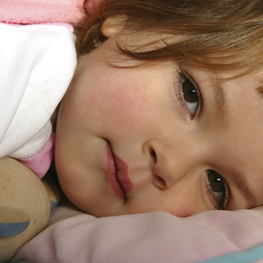
Getting kids to bed for a full night’s sleep is a tough task for parents. There are many distractions and demands that can get in the way. New research shows that poor night time sleep can have a harmful impact on child health. Children may even lose touch with their circadian clock, which controls sleep habits.
Dr. Lianne Tomfohr is a member of the Alberta Children’s Hospital Research Institute and holds the Alberta Children’s Hospital Foundation Professorship in Child Psychology. She is an assistant professor in the University of Calgary’s Department of Psychology. Her research looks at sleep quality in families.
“We now understand that the sleep habits that children form when they are young can carry through until they are adults. This means that it is especially important to set healthy and regular sleep habits starting from childhood.”
Why is good sleep so important?
Sleep helps your brain work properly. While you are sleeping, your brain is making new pathways to help you learn and remember things.
Sleep is good for your body. During sleep, your body releases hormones, which are vital for growth and healthy immune systems.
Sleep affects your mood. Poor sleep may lead to mood swings, feeling angry or sad and difficulty getting along with others.
How do you know if your child has a sleeping problem?
Your child takes a long time to fall asleep once they get into bed (more than 30 minutes).
Your child is tired and lacks energy throughout the day.
Your child dozes off during activities such as reading, watching TV and doing schoolwork.
How can you and your child sleep better?
Set regular bed/wake time routines and stick to them, even on the weekends!
Keep the bedroom quiet, cool and dark (a dim nightlight is okay).
Avoid watching TV or using a computer/tablet in bed. The bright light tells the brain that it’s time to be awake.
Avoid large meals before bedtime.
Keep your child physically active during the day; getting sunlight and fresh air is important!
“It is also important to make your bed comfortable and to use it only for sleeping. Doing other activities in bed such as reading, watching TV or doing schoolwork makes your brain think that being in bed is meant for activity instead of sleeping - making it harder to get good sleep at night.”
If you are interested in learning more about poor sleep quality and participating in a study to assess you and your child’s sleep, contact Dr. Lianne Tomfohr via email at This email address is being protected from spambots. You need JavaScript enabled to view it. or call 403-220-2243.
The Alberta Children’s Hospital Research Institute is a partner of the University of Calgary, Alberta Health Services and the Alberta Children’s Hospital Foundation. Its 200 researchers search for answers to understand and treat childhood disease. For more information, visit www.research4kids.ca.
Calgary’s Child Magazine © 2024 Calgary’s Child